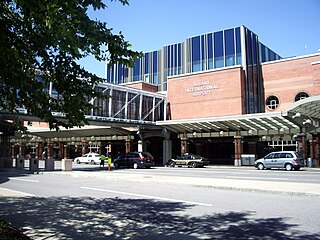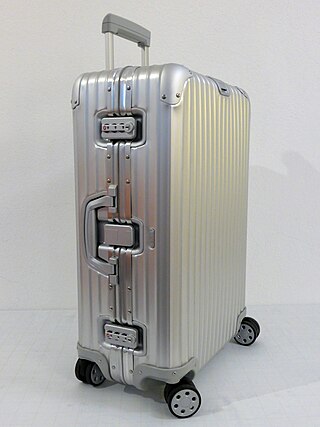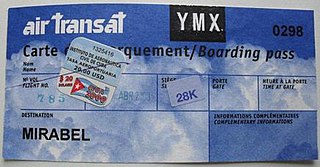Related Research Articles

Albany International Airport is six miles (9.7 km) northwest of Albany, in Albany County, New York, United States. It is owned by the Albany County Airport Authority. ALB covers 1,000 acres (400 ha) of land.

Detroit Metropolitan Wayne County Airport is the primary international airport serving Detroit and its surrounding metropolitan area in Michigan, United States. It is located in the City of Romulus and is Michigan's busiest airport.

JetBlue Airways Corporation is a major airline in the United States. Its headquarters is in Long Island City, in Queens, New York City. It also maintains corporate offices in Utah and Florida.

Checked baggage is luggage delivered to an airline or train for transportation in the hold of an aircraft, storage on a coach bus or baggage car of a passenger train. Checked baggage is inaccessible to the passenger during the flight or ride, as opposed to carry-on baggage.

A low-cost carrier (LCC) or low-cost airline, also called no-frills, budget, or discount carrier or airline, is an airline that is operated with an emphasis on minimizing operating costs. It sacrifices certain traditional airline luxuries for cheaper fares. To make up for revenue lost in decreased ticket prices, the airline may charge extra fees, such as for carry-on baggage. As of April 2020, the world's largest low-cost carrier is Southwest Airlines, which operates primarily in the United States, as well as in some surrounding areas.

Air travel is a form of travel in vehicles such as airplanes, jet aircraft, helicopters, hot air balloons, blimps, gliders, hang gliders, parachutes, or anything else that can sustain flight. Use of air travel began vastly increasing in the 1930s: the number of Americans flying went from about 6,000 in 1930 to 450,000 by 1934 and to 1.2 million by 1938. It has continued to greatly increase in recent decades, doubling worldwide between the mid-1980s and the year 2000. Modern air travel is much safer than road travel.

In airport terminals, a baggage reclaim area is an area where arriving passengers claim checked-in baggage after disembarking from an airline flight. The alternative term baggage claim is used at airports in the US and some other airports internationally. Similar systems are also used at train stations served by companies that offer checked bags, such as Amtrak in the United States.

Baggage or luggage consists of bags, cases, and containers which hold a traveler's personal articles while the traveler is in transit. A modern traveler can be expected to have packages containing clothing, toiletries, small possessions, trip necessities. On the return trip, travelers may have souvenirs and gifts. For some people, luggage and the style thereof is representative of the owner's wealth and status. Luggage is constructed to protect the items during travel either with a hard shell or a durable soft material. Luggage often has internal subdivisions or sections to aid in securing items. Handles are typically provided to facilitate carrying, and some luggage may have wheels and/or telescoping handles or leashes to make moving them easier.

Business class is a travel class available on many commercial airlines and rail lines, known by brand names which vary, by airline or rail company. In the airline industry, it was originally intended as an intermediate level of service between economy class and first class, but many airlines now offer business class as the highest level of service, having eliminated first class seating. Business class is distinguished from other travel classes by the quality of seating, food, drinks, ground service and other amenities. In commercial aviation, full business class is usually denoted 'J' or 'C' with schedule flexibility, but can be many other letters depending on circumstances.

A boarding pass or boarding card is a document provided by an airline during airport check-in, giving a passenger permission to enter the restricted area of an airport and to board the airplane for a particular flight. At a minimum, it identifies the passenger, the flight number, the date, and scheduled time for departure. A boarding pass may also indicate details of the perks a passenger is entitled to and is thus presented at the entrance of such facilities to show eligibility.

The term hand luggage or cabin baggage refers to the type of luggage that passengers are allowed to carry along in the passenger compartment of a vehicle instead of a separate cargo compartment. Passengers are allowed to carry a limited number of smaller bags with them in the vehicle, which typically contain valuables and items needed during the journey. There is normally storage space provided for hand luggage, either under seating, or in overhead lockers. Trains usually have luggage racks above the seats and may also have luggage space between the backs of seats facing opposite directions, or in extra luggage racks, for example, at the ends of the carriage near the doors.
A skycap is a porter employed at an airport and provides the following services to airline passengers:

Skybus Airlines Inc. was a privately held airline based in Columbus, Ohio, United States. It operated as an ultra low-cost carrier modeled after the European airline Ryanair, and aimed to be the least expensive airline in the United States. The business model was heavily reliant on flying routes where other airlines did not have direct flights, as Ryanair did in Europe, thus keeping competition to a minimum, and on flying into secondary airports, rather than heavily trafficked ones.
Boarding is the entry of passengers onto a vehicle, usually in public transportation. Boarding starts with entering the vehicle and ends with the seating of each passenger and closing the doors. The term is used in road, rail, water and air transport.

Airport check-in is the process whereby an airline approves airplane passengers to board an airplane for a flight. Airlines typically use service counters found at airports for this process, and the check-in is normally handled by an airline itself or a handling agent working on behalf of an airline. Passengers usually hand over any baggage that they do not wish or are not allowed to carry in the aircraft's cabin and receive a boarding pass before they can proceed to board their aircraft.

An airline ticket is a document or electronic record, issued by an airline or a travel agency, that confirms that an individual is entitled to a seat on a flight on an aircraft. The airline ticket may be one of two types: a paper ticket, which comprises coupons or vouchers; and an electronic ticket.

Premium economy class, also known by brand names which vary by company, is a travel class offered on many airlines. It is usually positioned between standard economy class and business class in terms of price, comfort, and available amenities. On December 12, 1992, EVA Air introduced the Economy Deluxe Class on the inaugural flight of its first trans-Pacific route (TPE-LAX), becoming the first airline to offer this class of service. In some countries, this class has emerged as a response from governments and companies requiring economy class for travel done by staff, while still getting some benefits like airport priority.

On commercial transportation, mostly with airlines, the baggage allowance is the amount of checked baggage or hand/carry-on luggage the company will allow per passenger. There may be limits on the amount that is allowed free of charge and hard limits on the amount that is allowed.
Gate check bags are travel bags specially designed for the transportation and storage of car seats and strollers or pushchairs. Generally used for airline travel, they also provide protection from dust when in storage for the occasional user. When used for airline travel the strollers and car seats are placed in gate check bags at the departure gate before boarding. The bags protect strollers and car seats from dirt whilst in the loading or cargo bay as well as from elements such as rain or snow if left on the tarmac.

Basic economy class is a travel class offered by a number of airlines. The class has superseded economy class as the cheapest airfare option for passengers and generally comes with more restrictions when compared to standard economy fares. Restrictions vary between different airlines, but they generally include not allowing passengers to change or cancel tickets or select seats for free. They are seen as a strategy for market segmentation.
References
- ↑ "What is gate checking a bag?". nicandrob.com.
- ↑ "Are Strollers Allowed on Planes?". wheretraveler.com.
- ↑ "Traveling With Children". United Airlines.
- ↑ "Baggage Allowance For a Lap Infant". JetBlue.
- ↑ "Carryon Baggage". Southwest Airlines .